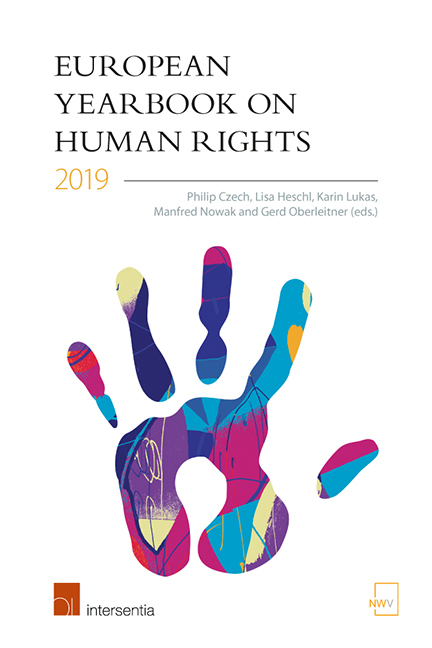Book contents
- Frontmatter
- Miscellaneous Frontmatter
- Editors’ Preface
- Contents
- List of Abbreviations
- List of Contributors
- PART I TOPIC OF THE YEAR
- PART II EU
- PART III CoE
- PART IV OSCE
- PART V REPORTS FROM THE FIELD
- PART VI OTHERS
- PART VII BOOK REVIEWS
- Lisa Heschl: Protecting the Rights of Refugees Beyond European Borders – Establishing Extraterritorial Legal Responsibilities
- Lorenza Violini and Antonia Baraggia (eds.): The Fragmented Landscape of Fundamental Rights Protection in Europe
- Panos Kapotas and Vassilis P. Tzevelekos (eds.): Building Consensus on European Consensus – Judicial Interpretation of Human Rights in Europe and Beyond
- Pieter van Dijk, Fried van Hoof, Arjen van Rijn and Leo Zwaak (eds.): Theory and Practice of the European Convention on Human Rights
- Adrienne Yong: The Rise and Decline of Fundamental Rights in EU Citizenship
- Jeroen Temperman, T. Jeremy Gunn and Malcolm Evans (eds.): The European Court of Human Rights and the Freedom of Religion or Belief – The 25 years since Kokkinakis
- Janneke Gerards: General Principles of the European Convention on Human Rights
- Index
Lorenza Violini and Antonia Baraggia (eds.): The Fragmented Landscape of Fundamental Rights Protection in Europe
from PART VII - BOOK REVIEWS
Published online by Cambridge University Press: 24 January 2020
- Frontmatter
- Miscellaneous Frontmatter
- Editors’ Preface
- Contents
- List of Abbreviations
- List of Contributors
- PART I TOPIC OF THE YEAR
- PART II EU
- PART III CoE
- PART IV OSCE
- PART V REPORTS FROM THE FIELD
- PART VI OTHERS
- PART VII BOOK REVIEWS
- Lisa Heschl: Protecting the Rights of Refugees Beyond European Borders – Establishing Extraterritorial Legal Responsibilities
- Lorenza Violini and Antonia Baraggia (eds.): The Fragmented Landscape of Fundamental Rights Protection in Europe
- Panos Kapotas and Vassilis P. Tzevelekos (eds.): Building Consensus on European Consensus – Judicial Interpretation of Human Rights in Europe and Beyond
- Pieter van Dijk, Fried van Hoof, Arjen van Rijn and Leo Zwaak (eds.): Theory and Practice of the European Convention on Human Rights
- Adrienne Yong: The Rise and Decline of Fundamental Rights in EU Citizenship
- Jeroen Temperman, T. Jeremy Gunn and Malcolm Evans (eds.): The European Court of Human Rights and the Freedom of Religion or Belief – The 25 years since Kokkinakis
- Janneke Gerards: General Principles of the European Convention on Human Rights
- Index
Summary
A spectre is haunting the international legal discourse – the spectre of fragmentation. While the matter of fragmentation of international law has already been the subject of an International Law Commission (ILC) Study finalised in 2006, fragmentation is also an increasing concern in the field of fundamental rights protection in Europe. But why is fragmentation such a critical issue? Would not one assume that the proliferation of legal instruments and judicial and non-judicial bodies is beneficial to the protection of European fundamental rights? As the editors of this compendium stress in their introduction, however, coherence and comprehensiveness are crucial elements for a functioning system of fundamental rights protection in the European Union (EU). The challenge of a ‘self-defeating [human rights inflation]’ (Matej Avbelj, p. 8), possible ‘tensions in the functioning of multilayered regimes’ (Federico Fabbrini, p. 28) and the potential for ‘conflicting jurisprudence’ (Šejla Imamović, p. 93) make the subject of fundamental rights fragmentation a topic that deserves further attention.
The 240 pages compendium addressing these concerns was edited by Lorenza Violini and Antonia Baraggia, both Professors at the University of Milan, and published in 2018. The book is divided into three parts, with the first being dedicated to the theoretical aspects of fundamental rights protection in Europe, the second to the judicial actors in the field, and the third to the role of bodies and agencies. The ten contributions come from academics from various universities and research institutions in Slovenia, Ireland, Italy, the Netherlands, Belgium, and Austria. The addressed readership are scholars and students of European human rights law, and – perhaps to a lesser extent – practitioners in the field. The volume fills a gap in the literature by shedding light on a pressing legal issue against the backdrop of a multifaceted crisis in the EU.
In Part I, three contributions set the theoretical stage for the discussion of the subject matter. Matej Avbeli provides the reader with a short overview of the development of fundamental rights protection in the EU. He introduces the European Court of Justice (ECJ), the European Court of Human Rights (ECtHR) and domestic courts as actors in the European human rights concert and gives three examples (the EU's accession to the European Convention on Human Rights (ECHR), the infamous Kadi case, and the rule of law crises in several EU Member States) that demonstrate the harmful impact of a fundamental rights overload.
- Type
- Chapter
- Information
- European Yearbook on Human Rights 2019 , pp. 571 - 572Publisher: IntersentiaPrint publication year: 2019



